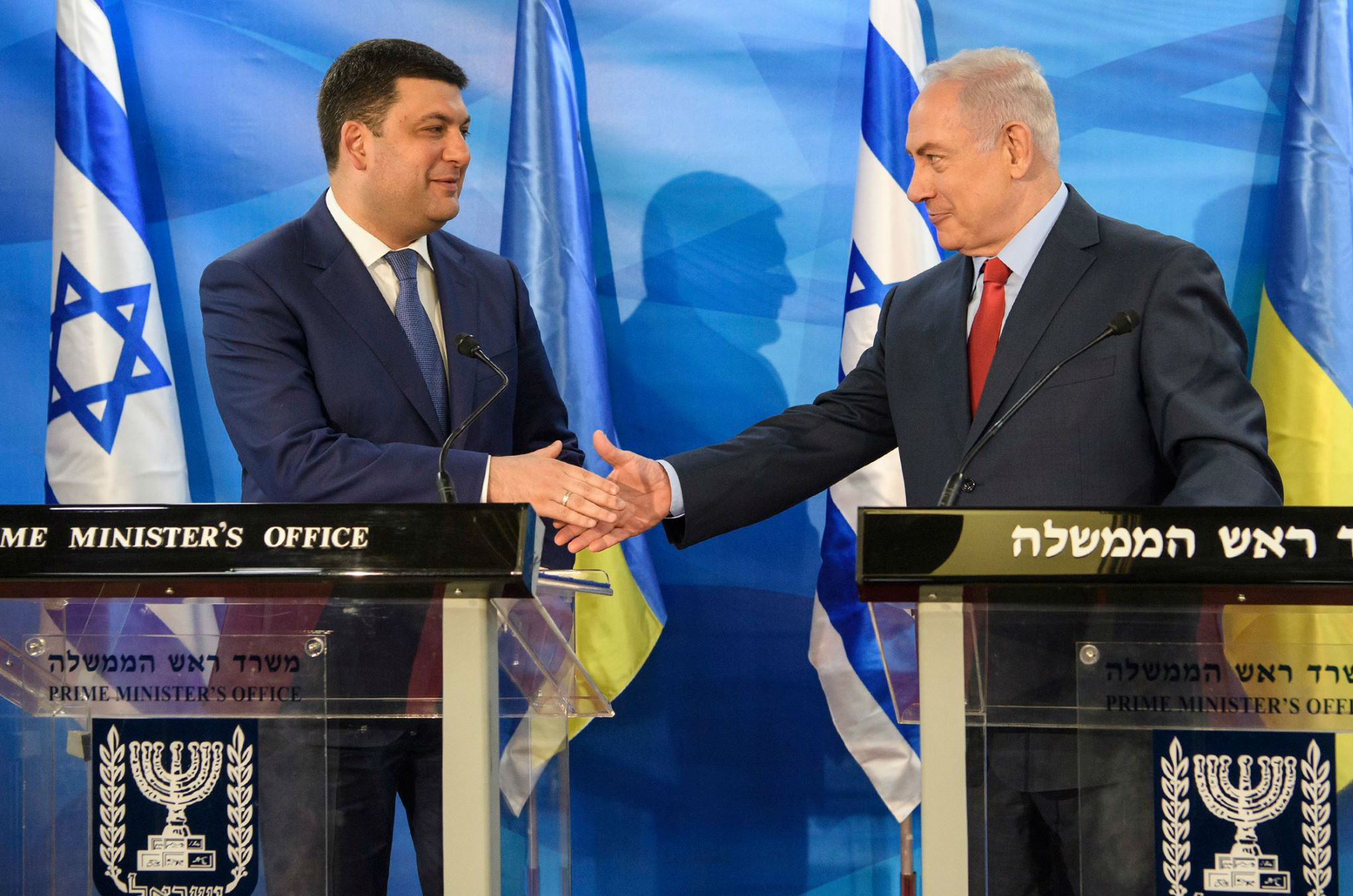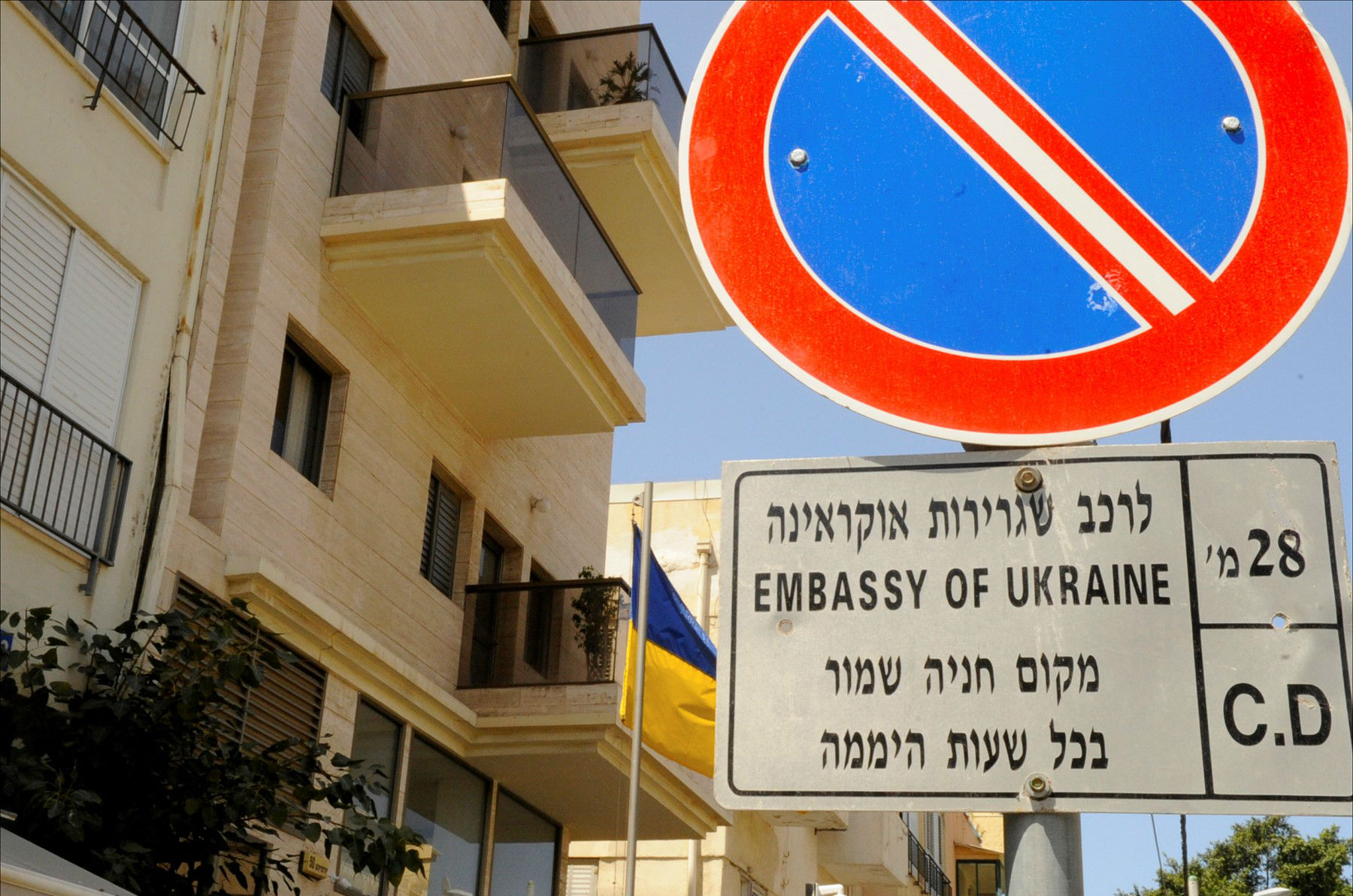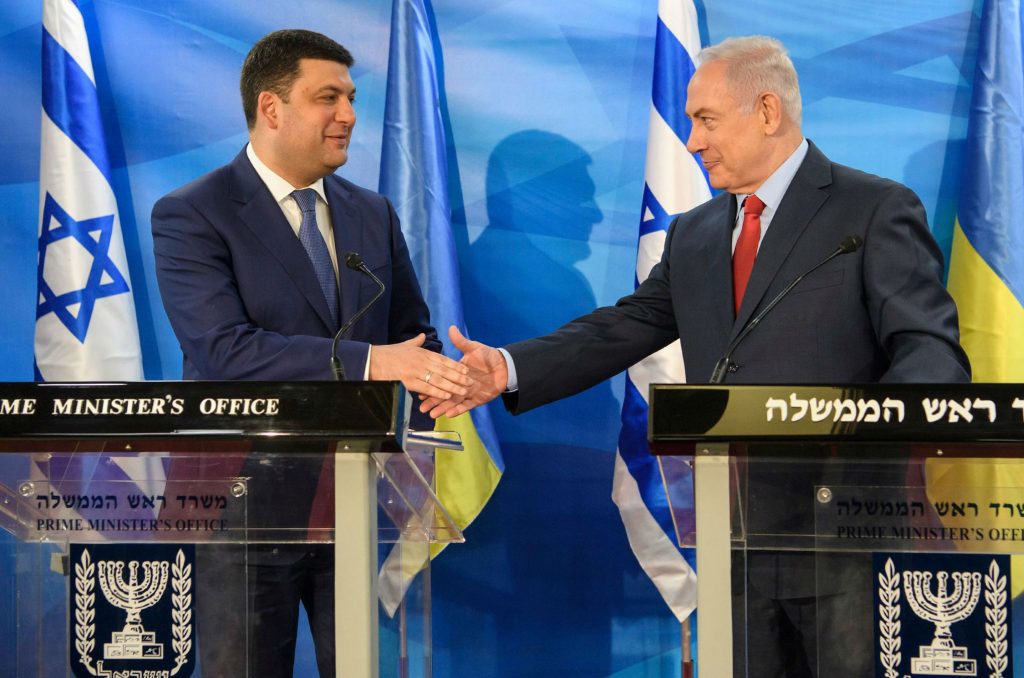 The May 14 arrival of Ukrainian Prime Minister Volodymyr Groisman to Israel signals a rapprochement of ties that suffered a temporary blow last December, when Ukraine—along with thirteen other countries—voted to support a UN Security Council resolution condemning Israeli settlements in the West Bank.
The May 14 arrival of Ukrainian Prime Minister Volodymyr Groisman to Israel signals a rapprochement of ties that suffered a temporary blow last December, when Ukraine—along with thirteen other countries—voted to support a UN Security Council resolution condemning Israeli settlements in the West Bank.
Groisman is the first Jewish prime minister in Ukrainian history. He was supposed to visit Israel on December 28, but Israel’s Foreign Ministry cancelled the trip after the lopsided vote, in which the United States abstained for the first time.
“I think now relations between Ukraine and Israel are very positive,” said Hennadii Nadolenko, Kyiv’s ambassador in Tel Aviv, in an emailed response to questions submitted by UkraineAlert. “Look at the dynamics of political dialogue on all levels. Only in the last two years we’ve had a number of presidential visits, including two state visits from both sides, and the first official visit to Ukraine in twenty-three years by the speaker of the Knesset last November … not to mention numerous visits of members of the parliaments of both countries.”
Nadolenko, 47, has been ambassador here since June 2010. During that time, bilateral trade has grown to about $1 billion annually. He said about 250,000 Israelis visit Ukraine each year, with an equal number of Ukrainians coming to Israel—well over twice the volume of tourism recorded only five years ago. At present, fifty-four flights per week link Tel Aviv to Kyiv, Dnipro, and Odesa, “and now we are talking about expanding this frequency.”
Yet relations hit a snag late last year when Ukraine—torn between its friendship with Israel and its desire not to appear hypocritical in the wake of Russia’s 2014 annexation of Crimea—voted to support UN Security Council Resolution 2334, which called Jewish settlements in the West Bank “a flagrant violation of international law.”
The resolution also called on Israel to “immediately and completely cease all settlement activities in the occupied Palestinian territory, including East Jerusalem.” (Israel captured the West Bank, East Jerusalem, the Golan Heights, the Gaza Strip, and the Sinai Peninsula during the Six-Day War of 1967, whose fiftieth anniversary is next month. It has since returned Sinai to Egypt and unilaterally withdrawn from Gaza.)
According to a Ukrainian Foreign Ministry statement issued at the time, Kyiv over the years “has adhered to the consistent and balanced position on the issue of the Israel-Palestinian conflict. We stand for peaceful coexistence of two independent states—Israel and Palestine. The settlement of the conflict must be carried out only through peaceful means. However, we emphasize the need for direct Israeli-Palestinian negotiations.”
The statement added: “Our country consistently advocates respect for international law by everyone and everywhere, as it has itself experienced the tragic consequences brought about by its violation. That’s why our position was formed on the basis of our consistent line to ensure respect for international law by all its subjects.”
The Ukrainian Embassy in Tel Aviv occupies a six-story building on Rehov Yirmiyahu, adjacent to the Pe’er Theater and the Super Baba 24-hour grocery store; across the street is the Ashkara hummus stand and a fresh-juice kiosk.

The Embassy of Ukraine in Tel Aviv, Israel. Credit: Larry Luxner.
At the embassy’s entrance is a large notice posted in English and Ukrainian “calling the attention of foreigners planning to visit the Autonomous Republic of Crimea,” to which it refers repeatedly as “the temporarily occupied territory of Ukraine”—language strikingly similar to that used by Palestinians when condemning Israel’s presence in the West Bank.
Nadolenko made no mention of the controversial UN vote, saying only that Groisman would spend two days in Israel. During that time, he plans to meet with Israeli Prime Minister Benyamin Netanyahu, President Reuven Rivlin, Knesset Speaker Yulii Edelstein, leading Israeli business executives, and representatives of Israel’s 500,000 or so citizens of Ukrainian descent.
“His working schedule in Israel will be very intense,” the ambassador told us. “We have negotiations of a wide range of bilateral issues, but first of all, of course, enhancing economic cooperation in different spheres of common interest and stepping up efforts to complete a bilateral free-trade agreement. The main emphasis will be placed on such sectors as agriculture, high-tech, and medicine.”
Also on the agenda: the signing of accords in healthcare, cooperation in emergencies, customs issues, and the employment of Ukrainian workers in specific Israeli market sectors.
He added that that by year’s end, the Poroshenko government hopes to wrap up free-trade talks between Ukraine and Israel that would boost business ties further.
Groisman, the former mayor of Vinnitsya—a city of 370,000—is no newcomer to Israel. He has family in the Mediterranean port city of Ashdod. In 2012, according to the Israeli newspaper Haaretz, Groisman welcomed Israeli Foreign Minister Avigdor Liberman to Vinnitsya to help inaugurate a state-of-the-art medical diagnostic center that Israeli investors built there.
“Today, many businessmen from Israel are going to Ukraine to invest in IT businesses,” said Nadolenko. “Ukraine is becoming one of the best places in the world to invest in IT programming.”
The two countries are also talking about jointly promoting cultural events including performances by famous Ukrainian singers and bands, a “Ukraine and Israel Together” charity concert and a Ukrainian film festival.
“We will work to maintain friendly relations between Ukraine and Israel, bringing our peoples closer and, in this regard, introducing more of Ukrainian culture to an Israeli audience,” Nadolenko said. “The Ukrainian side is also ready to cooperate with Israel to strengthen the fight against terrorism, to promote a peaceful settlement in the Middle East, and to restore the territorial integrity and sovereignty of Ukraine.”
One item not on the agenda, apparently, is an appeal by Ukrainian Jewish parliamentarian Alexander Feldman to move his country’s embassy in Tel Aviv to Jerusalem, where along with twenty-one other nations—including the United States—Ukraine already has a consulate. Feldman made his proposal in the wake of Ukraine’s vote on the UN resolution.
“For many years, my colleagues and I have been working to develop relations between our countries and we have achieved a lot,” Feldman told journalists at the time. “Of course, the consequence of our vote has disappointed Israelis and seriously undermines what we have achieved.”
Interestingly, US President Donald Trump, who visits Israel next week on his first overseas trip since his inauguration, has pushed for moving the US Embassy to Jerusalem as well. But given fierce opposition throughout the Arab world and even among many senior State Department officials, that idea is likely to go nowhere.
Tel Aviv-based journalist Larry Luxner is news editor of The Washington Diplomat. He tweets @LLuxner.
Image: Ukrainian Prime Minister Volodymyr Groisman meets with Israeli Prime Minister Benyamin Netanyahu in Jerusalem on May 15. Credit: Groisman Facebook Page
